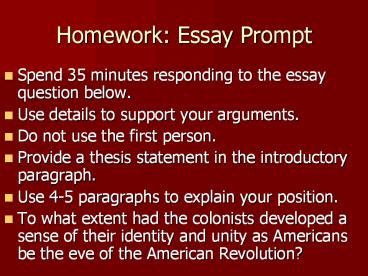Homework: Essay Prompt - PowerPoint PPT Presentation
1 / 27
Title:
Homework: Essay Prompt
Description:
Title: Campaign for New York and New Jersey, 1775 1777 Author: Pearson Education Last modified by: Campbpd Created Date: 7/23/1999 8:55:42 PM Document presentation ... – PowerPoint PPT presentation
Number of Views:99
Avg rating:3.0/5.0
Title: Homework: Essay Prompt
1
Homework Essay Prompt
- Spend 35 minutes responding to the essay question
below. - Use details to support your arguments.
- Do not use the first person.
- Provide a thesis statement in the introductory
paragraph. - Use 4-5 paragraphs to explain your position.
- To what extent had the colonists developed a
sense of their identity and unity as Americans be
the eve of the American Revolution?
2
The primary purpose of the Proclamation of
1763 A. Encourage westward colonial
migration. B. Avoid conflicts with the
Indians. C. Gain much-needed revenue. D. Drive
out French colonists. E. Provide a haven for
Catholics.
3
Creation of the United States, 1776-1786
- AP U.S. History
4
Causes for Revolution
- Salutary Neglect
- Navigation Acts
- No taxation without representation.
- Tax Acts to pay for French Indian War
- Nationalism
- Proclamation of 1763
5
Advantages Disadvantages
- British-Advantages
- Large empire
- Trained military
- Disadvantages
- Misjudged the rebellion.
- Offensive war.
- Americans-Advantages
- Thinly spread population
- Fight defensive war on own soil.
- Disadvantages
- Volunteer army.
- Lack of resources.
6
Battle Deaths
- 25,674 total deaths.
- 6,000 wounded.
- 10,000 from disease.
- 9,000MIA or prisoner camp deaths.
7
Continental Army
- Militia v. Standing army
- State quotas required men from each state.
- Service for 3 years
- Free land after victory
- 1777 9,000 with Washington
- Unify colonial factions who serve together.
8
Deserters Loyalists
- Deserters
- Lack of food, pay and weapons.
- No neutrality Either join the army/militia or
fight for the British. - Loyalists a.k.a. Tories
- 1/5 of population (approx. 500K).
- Strong in the lower south, weakest in NE.
- Slaves Indians
- Most famous is Benedict Arnold
9
Foreign Help
- French Spanish give financial and political
support. - French First to recognize U.S.
- Spanish Provide ammunition and supplies for
armies in the west. - Both want to stop the spread of Colonists.
10
Indians
- Fight with British for same reasons Americans
declared war - Political Independence
- Cultural Integrity
- Protection of land and property.
- Beginning of war in the west.
11
Battles
- Battle of Trenton, New Jersey (1776) General
Washington and forces surprise the Hessians and
destroy their forces. - Significance Boosts Continental Army morale and
increases enlistments. Colonies had suffered
several losses in the NY area and many thought
they were about to lose the fight against the
British.
12
Battles
- Battle of Saratoga, New York (September-October,
1777) Patriots defeat the British in two
battles. General Burgoyne surrenders his 5,000
men. - Significance Major turning point. British
realize they are not going to be able to conquer
the northern colonies. French decide to support
the colonies in the war.
13
Battles
- Battle of Yorktown, Virginia (1781) General
Cornwallis and one-third of the British army
surrender. - Significance Last major battle of the American
Revolution.
14
Articles of Confederation
- Nov. 1777 adopted by the CC.
- Created a congress each state has one vote.
- Can conduct foreign policy, maintenance of army,
raise loans, issue bills of credit, regulate
trade.
15
Articles Weaknesses
- Amendment required 13 votes.
- Weak central government.
- No
- Power to tax
- Power to enforce single currency
- Provide a standing army.
16
Money
- 9M from foreign
- countries for the war.
- 200M in Continental
- Currency printed.
- Instead of raising taxes
- to cover debt, states print
- their own currency.
- Inflation hurts those on a fixed income.
17
After the Treaty of Paris, 1783
18
Treaty of Paris, 1783
- Peace talks begin April 1782.
- Main goal Withdrawal of British and recognition
of U.S. - France Spain initially left out of
negotiations. - Separate treaties finally leave with Spain with
more territory than before.
19
State Claims to Western Lands
20
Western Expansion
- Indians do not consider themselves conquered
people. - Spanish close MS River to Americans.
- Congress passes Land Ordinance of 1785.
- Northwest Ordinance of 1787
- Created OH, IN, IL, MI WI
- Prohibited slavery in NW states.
- Weak government.
21
Northwest Territory
22
Politics Growth of Republicanism
- Relax property qualifications for voting.
- Total democracy becomes desirable Democrats
- Conservatives fear the tyranny of the many or
unthinking Whigs.
23
State Constitutions
- 14 states (1776-1780) create constitutions.
- PA most radically democratic
- MD most conservative, keeping people and rulers
separate - NY in the middle
- NJ grants all free inhabitants with property
right to vote. - Revolution does not change womens role but
increases expectations.
24
Thomas Jefferson
- Declaration of Independence
- Bill for Establishing Religious Freedom (1786)
- Bill to emancipate slaves
- Public school system
25
African Americans
- American contradiction in waging war for liberty.
- 55K slaves leave with British.
- Slavery abolished in VT in 1777, MA in 1780 NH
in 1784. - 1786 all northern states but DE.
- 1810 30,000 slaves still in North.
- 200,000 free African Americans by 1800.
26
Postwar Inflation, 17771780 Depreciation of
Continental Currency
27
Economic Problems
- 50M in debt by 1785.
- Depression after Revolution.
- Trade deficit with Britain.
- Shays Rebellion
- A little rebellion is good every now and then,
T. Jefferson. - It is time to clip the wings of a mad
democracy, H. Knox.































